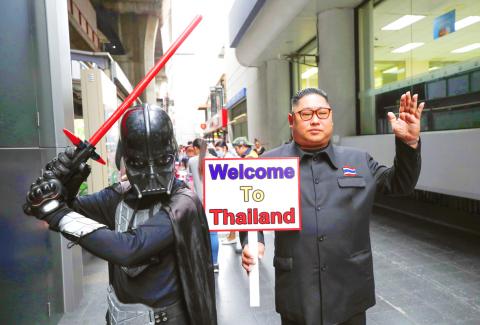The administration of US President Donald Trump has stepped up efforts to contain China’s rise, warning Asia’s leaders against taking its cash and using its equipment for 5G networks, but when it comes to the region’s biggest summit, the US is happy to let Beijing take center stage.
Trump plans to skip the East Asia Summit for the third straight year and this time he is not even sending US Vice President Mike Pence or US Secretary of State Michael Pompeo to replace him.
Instead, the US is to have its lowest-level representation at the meeting since then-US president Barack Obama joined the group in 2011, with new US National Security Adviser Robert O’Brien leading the delegation to Bangkok.

Photo: EPA-EFE
“We accommodated China’s rise, in the hope that they would become more free. In response, the CCP [Chinese Communist Party] took advantage of our goodwill,” Pomepo tweeted late on Wednesday. “Now, @realDonaldTrump is facing the reality of CCP hostility to the US and our values. We must engage China as it is, not as we wish it to be.”
Beijing plans to send Chinese Premier Li Keqiang (李克強) — Chinese President Xi Jinping’s (習近平) No. 2 — as it does every year.
While the summits often achieve little in terms of substantive outcomes, they remain one of the few places where leaders can openly discuss thorny issues ranging from trade to terrorism and territorial disputes in the South China Sea.
“In a region where just showing up has huge symbolism, the absence of Trump and Pence will no doubt raise renewed questions about how important Asia is in the US’ priorities,” Center for Strategic and International Studies senior associate Murray Hiebert said. “For the top echelons of the US foreign policy establishment not to show up would appear to hand China another opportunity to show that the US is distracted.”
Among the 40 agreements that are to be signed in Bangkok, the biggest one is not to include the US.
China, India, South Korea, Japan, Australia, New Zealand and the 10 ASEAN members are close to a breakthrough on the Regional Comprehensive Economic Partnership, which would reduce tariffs in an area representing about one-third of the world’s economy.

The Ministry of Foreign Affairs (MOFA) yesterday said it is closely monitoring developments in Venezuela, and would continue to cooperate with democratic allies and work together for regional and global security, stability, and prosperity. The remarks came after the US on Saturday launched a series of airstrikes in Venezuela and kidnapped Venezuelan President Nicolas Maduro, who was later flown to New York along with his wife. The pair face US charges related to drug trafficking and alleged cooperation with gangs designated as terrorist organizations. Maduro has denied the allegations. The ministry said that it is closely monitoring the political and economic situation

UNRELENTING: China attempted cyberattacks on Taiwan’s critical infrastructure 2.63 million times per day last year, up from 1.23 million in 2023, the NSB said China’s cyberarmy has long engaged in cyberattacks against Taiwan’s critical infrastructure, employing diverse and evolving tactics, the National Security Bureau (NSB) said yesterday, adding that cyberattacks on critical energy infrastructure last year increased 10-fold compared with the previous year. The NSB yesterday released a report titled Analysis on China’s Cyber Threats to Taiwan’s Critical Infrastructure in 2025, outlining the number of cyberattacks, major tactics and hacker groups. Taiwan’s national intelligence community identified a large number of cybersecurity incidents last year, the bureau said in a statement. China’s cyberarmy last year launched an average of 2.63 million intrusion attempts per day targeting Taiwan’s critical

‘SLICING METHOD’: In the event of a blockade, the China Coast Guard would intercept Taiwanese ships while its navy would seek to deter foreign intervention China’s military drills around Taiwan this week signaled potential strategies to cut the nation off from energy supplies and foreign military assistance, a US think tank report said. The Chinese People’s Liberation Army (PLA) conducted what it called “Justice Mission 2025” exercises from Monday to Tuesday in five maritime zones and airspace around Taiwan, calling them a warning to “Taiwanese independence” forces. In a report released on Wednesday, the Institute for the Study of War said the exercises effectively simulated blocking shipping routes to major port cities, including Kaohsiung, Keelung and Hualien. Taiwan would be highly vulnerable under such a blockade, because it

Conflict with Taiwan could leave China with “massive economic disruption, catastrophic military losses, significant social unrest, and devastating sanctions,” a US think tank said in a report released on Monday. The German Marshall Fund released a report titled If China Attacks Taiwan: The Consequences for China of “Minor Conflict” and “Major War” Scenarios. The report details the “massive” economic, military, social and international costs to China in the event of a minor conflict or major war with Taiwan, estimating that the Chinese People’s Liberation Army (PLA) could sustain losses of more than half of its active-duty ground forces, including 100,000 troops. Understanding Chinese